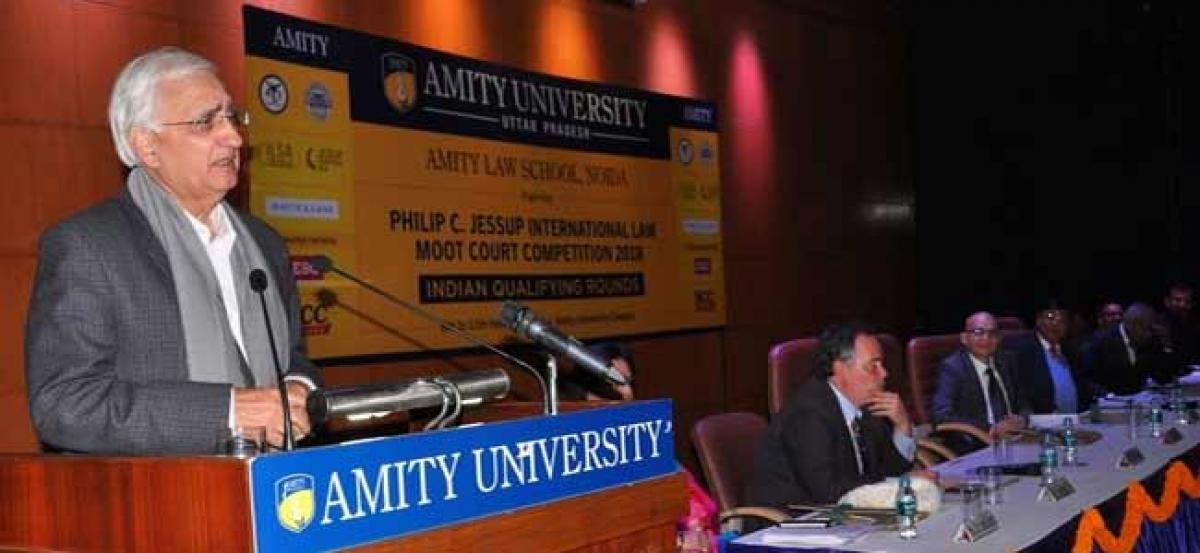Live
- A feminist lens on our mythology
- Prakasam police rescues kidnapped toddler within hours
- Time to get rid of Sattavad and Parivarvad politics
- Extend neither spl nor ill treatment
- Must-Watch OTT Originals in 2024: The Year’s Best Shows and Movies
- 40 Indian startups secure over $787 mn in a week
- India now formidable force on chess board
- Raghavendra Mutt pontiff visits Tirumala
- Whistleblower of OpenAI found dead in US apartment
- Trump’s US-first policy & India’s strategic latitude
Just In

In presenting a case before a court or a bench of judges, a lawyer must always have the capacity to listen to a judge or judges attentively and, when they tell a lawyer to stop, then he should put his or her arguments to rest, said former union minister and senior lawyer Salman Khurshid.
Noida (Uttar Pradesh) : In presenting a case before a court or a bench of judges, a lawyer must always have the capacity to listen to a judge or judges attentively and, when they tell a lawyer to stop, then he should put his or her arguments to rest, said former union minister and senior lawyer Salman Khurshid.
Participating in the recently held national qualifying rounds of the Philip C. Jessup International Law Moot Court Competition, Khurshid said, "Judges probably know more than the lawyers through past experience, but they have a tough job since despite knowing everything, they tell lawyers to explain them law. If a lawyer is mistaken in believing otherwise, he loses the case."
He added, "Young lawyers, while keeping this fact in mind, should be able to nudge judges at the right moment, in the right manner so that judges can themselves think that a new thought has come out. In such a situation, even if a lawyer will lose the case, he will be enormously appreciated by the judge and, that's the biggest gift one can get at the Bar."
He advised budding lawyers to engage in fundamental areas that have not been explored and understand how judges could be different - one judge may think very simply and straight based on what is legal law, while another may explore much wider and greater.
Khurhsid asserted that if lawyers are able to impress judges with their command of material and their ability to grow larger thoughts, then they have the makings of not just a profound lawyer, but also, an outstanding judge.
The Philip C. Jessup International Law Moot Court Competition is the oldest and largest International Moot Competition in the world.
A record-breaking 100 countries are expected to participate in the finals scheduled in April,2018.
The competition provides a stellar opportunity to students aspiring to join advocacy as a profession to learn about court craft.
The Indian National Qualifying Rounds are the exclusive means by which Indian law students qualify for the finals of the competition to be conducted in Washington DC.
This year, 35 teams across India are competing in India National Rounds including National University of Study and Research in Law, Ranchi, The West Bengal National University of Juridical Sciences, Kolkata, National Academy for Legal Studies and Research, Hyderabad, National Law School of India University, Banglore, National Law Institute University, Bhopal Rajiv Gandhi National University of Law, Punjab and others from February 8 to 11 at Amity University. Four teams will be selected out of these to represent India in the finals.
Dr. Ashok K Chauhan, Founder President, Amity Group described legal brains of India as among the best worldwide. He expressed his conviction that the Indian team will win the finals of Philip C. Jessup International Law Moot Court Competition and bring laurels to the country.
Delhi High Court judge Justice Rajiv Shakdher described mooting as a great idea since it imbibes structured process of thinking in budding lawyers, nurturing social skills in them by providing them with an opportunity to meet people from diverse cultures and ethnicities in a moot court and accommodates each other's' views.
He remarked that the most important facet of mooting is that it actually trains students about walking away with lost case since there is generally one winner at the end of every competition, thereby preparing them for the profession as well as life.
"It is important for budding lawyers to understand that they may lose the case, but they should never lose the court of the judge; it is important never to get into an argument with a judge, since it takes years of practice to win the goodwill of a judge," he said.
Dr. Pinky Anand, Additional Solicitor General of India, said, "It is a matter of great repute to be associated with Jessup which is the oldest and largest international moot court competition."
"It is important for a lawyer, right from the beginning of his or her profession, to understand various stages of trial, appeal, presentations, oral arguments and there is no other way hands on approach to learn all these at this phase of their lives than through mooting, "she added.
Talking about the recent election of Justice Dalveer Bhandari from India in International Court of Justice (ICJ) and the importance of being represented at the global level, Ms. Anand said that it is for the first time that five nations are not been represented in ICJ, and an Indian, Justice Dalveer Bhandari had 193 votes from General Assembly, making UK representative- Christopher Greenwood to withdraw.
Corroborating this fact further with the case of Kulbhushan Jadhav and the decision of 11-judge bench of the International Court of Justice staying the execution of Jadhav by Pakistani Military Court until further notice, Ms. Anand stressed that the case demonstrated the strength that India can have and the conviction that India will be able to increase its presence in global arena to ensure the rule of law and the global order.

© 2024 Hyderabad Media House Limited/The Hans India. All rights reserved. Powered by hocalwire.com







